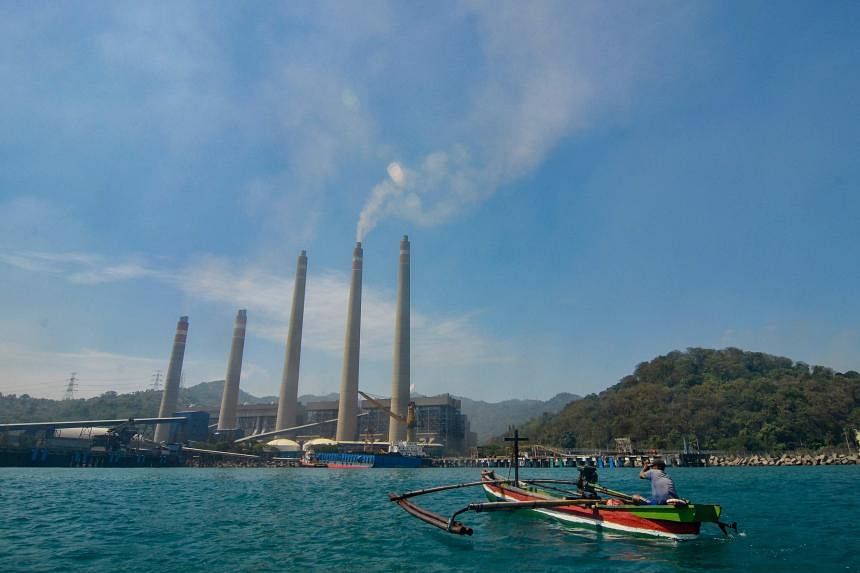
The impact of pollution from Suralaya costs Indonesia US$1 billion (S$1.36 billion) every year.
APR 26, 2024,
JAKARTA - Green non-governmental organisations (NGO) have accused the Asian Development Bank (ADB) of indirectly financing coal plants in Indonesia through a US$600 million (S$816 million) loan despite promises to no longer fund projects tied to the fossil fuel, according to a new report.
The report by four NGOs alleges the ADB loan given in 2021 to Indonesia’s state power company to fund its 10-year business plan and “promote the use of clean energy” has no clause blocking spending on new coal facilities.
The Perusahaan Listrik Negara (PLN) plan contains more than a dozen new coal projects, including an expansion at Java island’s Suralaya, one of the biggest coal-fired plants in South-east Asia, which will add two generating units to eight in operation.
“ADB’s loan agreement does not just fail to exclude coal. It actually allows PLN to use ADB funding for coal-fired power plants,” said Mr Dustin Roasa, research director at Inclusive Development International, which published the report on April 24.
“The loan’s eligible expenditures expressly cover anything in PLN’s 10-year plan, which does not shy away from new coal.”
The report gives locals’ accounts of how a previous expansion at Suralaya in Banten province neighbouring capital Jakarta “displaced families, reduced fish stocks... and sickened their children”.
The impact of pollution from Suralaya costs Indonesia US$1 billion every year because of preventable deaths, work absences and medical costs, a study published in 2023 by the Europe-based Centre for Research on Energy and Clean Air said.
“Publicly funded institutions like the Asian Development Bank must include robust coal exclusions in contracts... in order to end coal finance for good,” said Mr Daniel Willis, finance campaigner at NGO Recourse.
The report said the loan entered PLN’s general bank account and was not put into a separate account that could be monitored, allowing it to be spent however PLN wants. It did not claim the loan was directly used to fund Suralaya.
An ADB spokesperson said the loan agreement does “not include support for coal-fired power plants”, adding that it was a results-based loans in which the borrower must achieve certain targets including promoting clean energy before the loan tranches are disbursed.
“The loan does not violate ADB’s energy policy,” the spokesperson said.
PLN did not respond to an AFP request for comment about the report, which was released ahead of ADB’s annual meeting in Georgia next week.
The bank provides loans and grants for projects in the poorest countries in the Asia-Pacific region and has pledged to not fund “new coal-based capacity for power and heat”.
The ADB has a financing scheme for Asian governments to retire coal plants and in December agreed on a deal with the owners of the Cirebon-1 coal-fired power plant in Indonesia to shut it down seven years early. AFP
JAKARTA - Green non-governmental organisations (NGO) have accused the Asian Development Bank (ADB) of indirectly financing coal plants in Indonesia through a US$600 million (S$816 million) loan despite promises to no longer fund projects tied to the fossil fuel, according to a new report.
The report by four NGOs alleges the ADB loan given in 2021 to Indonesia’s state power company to fund its 10-year business plan and “promote the use of clean energy” has no clause blocking spending on new coal facilities.
The Perusahaan Listrik Negara (PLN) plan contains more than a dozen new coal projects, including an expansion at Java island’s Suralaya, one of the biggest coal-fired plants in South-east Asia, which will add two generating units to eight in operation.
“ADB’s loan agreement does not just fail to exclude coal. It actually allows PLN to use ADB funding for coal-fired power plants,” said Mr Dustin Roasa, research director at Inclusive Development International, which published the report on April 24.
“The loan’s eligible expenditures expressly cover anything in PLN’s 10-year plan, which does not shy away from new coal.”
The report gives locals’ accounts of how a previous expansion at Suralaya in Banten province neighbouring capital Jakarta “displaced families, reduced fish stocks... and sickened their children”.
The impact of pollution from Suralaya costs Indonesia US$1 billion every year because of preventable deaths, work absences and medical costs, a study published in 2023 by the Europe-based Centre for Research on Energy and Clean Air said.
“Publicly funded institutions like the Asian Development Bank must include robust coal exclusions in contracts... in order to end coal finance for good,” said Mr Daniel Willis, finance campaigner at NGO Recourse.
The report said the loan entered PLN’s general bank account and was not put into a separate account that could be monitored, allowing it to be spent however PLN wants. It did not claim the loan was directly used to fund Suralaya.
An ADB spokesperson said the loan agreement does “not include support for coal-fired power plants”, adding that it was a results-based loans in which the borrower must achieve certain targets including promoting clean energy before the loan tranches are disbursed.
“The loan does not violate ADB’s energy policy,” the spokesperson said.
PLN did not respond to an AFP request for comment about the report, which was released ahead of ADB’s annual meeting in Georgia next week.
The bank provides loans and grants for projects in the poorest countries in the Asia-Pacific region and has pledged to not fund “new coal-based capacity for power and heat”.
The ADB has a financing scheme for Asian governments to retire coal plants and in December agreed on a deal with the owners of the Cirebon-1 coal-fired power plant in Indonesia to shut it down seven years early. AFP
No comments:
Post a Comment